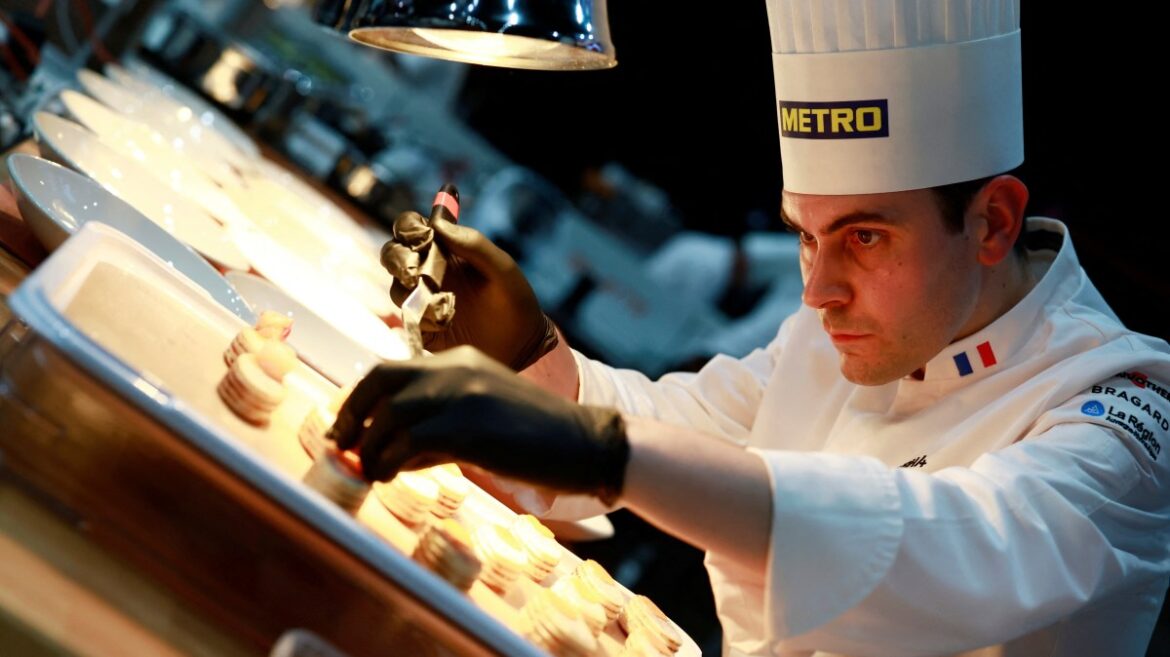French pride was restored on Monday as the country won top prize in the world’s most prestigious cooking competition in front of a delirious home crowd.
Paul Marcon, 28, emerged first in the Bocuse d’Or competition in Lyons, which is seen in France not only as a gastronomic event but as a vehicle for exercising soft power around the world.
With President Macron discredited, the French economy in the doldrums and diplomats struggling to be heard on the international stage, officials were banking on chefs such as Marcon to uphold national honour and influence.
Marcon was backed by a €500,000 budget to help his drive for victory after a series of Scandinavian triumphs in recent editions of the Bocuse d’Or. It paid off as France pushed Denmark into second place and Sweden third.

Team France supporters at the Bocuse d’Or finale
REYNAUD JULIEN/APS-MEDIAS/ABACA/REX/SHUTTERSTOCK
Laurent Wauquiez, the head of the regional Auvergne-Rhône-Alpes council, which contributed more than €100,000 to the French team’s budget, said “the brand image of France” depended upon its cooking. He described chefs like Marcon as “ambassadors”.
Marcon was following in the footsteps of his father Régis, a renowned chef who won the Bocuse d’Or in 1995.
Teams from 24 countries in the final had five hours and 50 minutes to cook a venison shoulder and foie gras pie wrapped in crispy pastry and served with fruit garnish, bi-coloured ravioli and a clarified venison consommé infused with tea. They also took four hours and 40 minutes to produce a stone bass, lobster and celery dish.

Marcon competing in the final
JEFF PACHOUD/AFP/GETTY IMAGES
The atmosphere was like a football match with supporters cheering the finalists at the exhibition hall in Lyons, where the biennial competition is always held, giving the French team a permanent home advantage.
Jérôme Bocuse, the competition founder’s son, said medal winners were inundated with requests from investors wanting to put money into their restaurants. “When a cook wins the Bocuse d’Or, his life as a chef is transformed,” he said.
Marcon and his team had spent six months preparing for the competition and have been practising the dishes they presented every other day since December. They had mental, physical and tactical training sessions before the event.
Future French candidates are likely to benefit from even more comfortable conditions, with the launch this month of work on a cooking academy near Lyons that will specialise in preparations for major competitions.
The National Gastronomy Centre has been compared to the French National Football Institute at Clairefontaine in the Paris region, where the likes of Thierry Henry and Kylian Mbappé went before starting their professional careers. Officials say they hope to find and develop the Mbappé of cuisine at the new centre, which will cost €23 million.
The UK was represented in the contest by Tom Phillips, 32, executive chef at Restaurant Story in London, who came fifth. Phillips, from Newport, south Wales, began by cooking cakes with his mother, but has gone on to become known for his delicate and intricate dishes, according to Team UK. His commis was Harry van Lierop, 21, who works at The Ledbury restaurant in London.

Harry van Lierop, for Team UK, plates up food and adds the finishing touches
JODI HINDS

They put a distinctive British touch to the dishes, which included venison and foie gras pie with a wild Scottish juniper glaze
JODI HINDS
They added a distinctive British touch to the dishes, putting prunes and New Forest wild mushrooms to the venison and foie gras pie with a smouldering wild Scottish juniper glaze. This was served with ravioli containing sweet chestnut, British root vegetables, garden thyme and chive buds, and baked late season red Williams pears, preserved English cherry and woodland berries. Their lobster and stone bass dish was accompanied by a celery branch, English walnut and fresh horseradish salad.
British candidates, who receive no public funding, unlike the French and the Scandinavians, have never finished higher than fourth.

